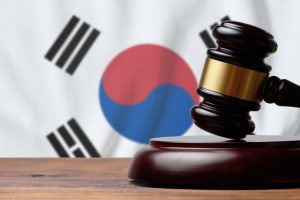South Korea experienced a particularly tumultuous modern history. Over the course of the 20th century, it faced subjugation and oppression under Japanese colonial authorities, three years of deadly violence during the Korean War, and finally saw the nation’s hopes of freedom extinguished by successive authoritarian regimes. When democracy arrived in the late 1980s in the wake of mass protests, the population naturally had a pent-up desire to address the many massacres and human rights violations that they had suffered prior to transition.
During the early post-transition years, there were few criminal prosecutions of those responsible for past atrocities, despite the efforts and hopes of many activists. The one notable trial was that of former leaders Chun Doo-hwan and Roh Tae-woo in 1996, but it was only partially successful. While both were convicted of corruption, military insubordination, and subversion of the constitutional order, they were pardoned and released from prison relatively soon afterward.
Instead, Korean politicians turned their attention to truth commissions as a way of investigating past human rights violations, establishing victim-status, and clearing the names of those falsely accused. In fact, at least 15 truth commissions have been created since 1996, addressing a remarkably wide range of issues. Most of these commissions have had narrow mandates, addressing a particular issue or incident. Examples include the Commission on Confiscation of Properties of Pro-Japanese Collaborators and the Commission for Truth-Seeking and Honor Restoration for Victims of Jeju April 3 Events.
The Truth and Reconciliation Commission of Korea, on the other hand, was broadly tasked with investigating the anti-Japanese independence movement, Korean War massacres, human rights violations during the period of authoritarian rule, and killings by hostile forces. The Commission completed its final report in 2010, but was relaunched in December 2020 for a three-year period, which was later extended until May 2025.
These truth commissions were in many ways successful initiatives. They gave victims a much-needed voice, corrected false narratives about events such as the 1980 Gwangju massacre, and publicly acknowledged a myriad of previously little-known human rights violations from the authoritarian era. They also uncovered the participation of U.S. actors in some of these violations.
With the Truth and Reconciliation Commission entering its final year, though, and the recent closure of the Presidential Truth Commission on Deaths in the Military, it seems as if the era of truth commissions may be winding down. With a few notable exceptions, the major atrocities and human rights violations from the pre-1987 period have already been investigated.
What next for South Korea’s transitional justice project? The appetite to address past human rights abuses remains strong, at least among left-wing politicians. One possibility is a shift to addressing transitional justice in the courtroom.
In a number of recent cases, plaintiffs successfully sought compensation from the state for past human rights violations, including torture, kidnapping, and the commission of atrocities by Korean troops during the Vietnam War. In each of these cases, judges found statutes of limitations to be inapplicable. More of these lawsuits are sure to come, and when making their cases, plaintiffs’ lawyers will be able to rely on the findings of the various truth commission reports published over the years.
With truth commission reports having now established an accepted historic narrative, a more controversial type of lawsuit is also emerging: blasphemy cases for those who embrace historical falsehoods (in the eyes of the courts). In December 2021, the National Assembly passed amendments to the Special Act on the May 18 Democratization Movement, providing for imprisonment of up to five years for disseminating false information about the Gwangju massacre. Left-wing parliamentarians also introduced a law to prohibit distortion of history or acts praising Japanese colonialism, with penalties of up to 10 years in prison, but the bill did not pass.
Despite criticism from free speech advocates, anti-blasphemy cases are beginning to have an impact – last year Jee Man-won was given a two-year prison sentence for asserting that North Korea was behind the Gwangju protests. More recently, Yonsei University professor Lew Seok-choon was prosecuted for referring to the “comfort women” – sex slaves used by the Japanese army – as voluntary prostitutes. Lew was acquitted, but his case is currently being appealed by prosecutors.
Finally, the possibility remains that courts can be used once again for criminal prosecutions of those responsible for past violations. This is of course more far-fetched: with Chun and Roh’s deaths within a month of each other in 2021, the worst offenders can no longer be tried, and it can be assumed that most other potential defendants will also have passed away. The issue of statute of limitations also remains a challenge.
Nevertheless, Democratic Party leader Lee Jae-myung had expressed the desire to restart prosecutions, and influential scholars have argued that statute of limitations should not apply in cases of state violence. A recent law expressly specified that the statute of limitations should not apply to crimes against humanity or crimes disrupting the constitutional order that were committed during the Gwangju massacre.
Whether or not the courtrooms end up providing an adequate venue for battles over the past, it is clear that the abuses of the past remain salient to Korean politicians and segments of the public. The Korean left, in particular, is still dominated by human rights lawyers who came of age during the fight for democracy. The focus on transitional justice may only change when the younger generation, who lack direct experience with the repressive regimes of pre-1987 Korea, takes its place in the political spotlight.

































